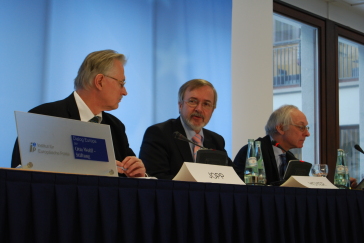IEP Lunch Debate with Dr. Werner Hoyer: “The Treaty of Lisbon in Practice – Perspectives and Challenges for 2010”

Shortly after reassuming the role of Minister of State in the Federal Foreign Service, Dr. Werner Hoyer, Member of the German Parliament, spoke at the IEP Lunch Debate on 26 January 2010 on the topic of “The Treaty of Lisbon in Practice – Perspectives and Challenges for 2010”.
Hoyer began by emphasizing that he was extraordinarily pleased, after eleven years, to once again serve as the Minister of State and to be in position to shape priorities on European policy. In the meantime, the EU’s decision-making processes and German policy on Europe had both changed. The successful completion of the institutional reforms in the Treaty of Lisbon is also noteworthy. Hoyer recommended that the general public be made aware of the benefits of the new treaty rules. He explained that the European public must understand that the reforms to European institutions have an effect on citizens’ interests and are not purely bureaucratic measures. On the contrary, they exemplify the public’s growing opportunity to have a meaningful effect on Europe via the EU, e.g., the strengthened European Parliament and the introduction of the European Citizens’ Initiative.
Hoyer then painted a bleak picture for the upcoming months in light of the emerging financial crisis in Greece. It is very possible that Greek problems will “spill over” into the rest of the Eurozone, and therefore the extent to which the other Eurozone countries can react is an important question. On a related note, the adoption of a post-Lisbon strategy will be an important factor in stimulating the return of economic growth in the Eurozone. A sustainable strategy for growth and employment is therefore more important than ever. The current Spanish presidency of the EU must dedicate all the resources at its disposal to this great challenge.
Turning to the catastrophic earthquake in Haiti, Hoyer highlighted the readiness of EU member states to provide a concentrated approach to their assistance. This extreme situation provides the opportunity for Europe to lend its expertise in crisis management, particularly in regards to the rebuilding efforts. On the other hand, the EU must also learn from the failures of the European negotiation strategy at the UN Climate Change Conference in Copenhagen. It is extraordinarily difficult to bring “on board” those developing countries which are only beginning to industrialize. Hoyer stated that it is no longer sufficient for EU member states to simply provide a good example.
As the final theme of his speech, Hoyer discussed the new EU roles occupied by Herman van Rompuy and Catherine Ashton and the creation of the European External Action Service (EEAS). It is clear that van Rompuy has greater ambitions than to just “play the messenger.” In light of global challenges, a strong European leadership is more important than ever and will have a growing influence on the European Commission (EC). From the perspective of the Federal Foreign Service, it is regrettable that the Foreign Minister will no longer automatically attend the meetings of the EC. Hoyer suggested that each member state should be allowed to send a selected representative to all EC meetings. In such a case, Germany would send the Vice-Chancellor as delegate. In the future, the EC will have an increased importance as a decision-making body because, according to Hoyer, there is not as strong a need for coordination in the EC as there is between ministries. This procedural difficulty has unnecessarily delayed decisions to this point.
The creation of the EEAS was viewed with great interest by the Foreign Service, which regrets their delayed reaction to the appointment process. The Federal Government pressed for sufficient posts in the national diplomatic services to be filled. Hoyer emphasized that it will be crucial that the expertise of the national diplomatic services be applied in the EEAS. Additionally, Hoyer stressed the importance of the European Commission, whose monopoly on initiatives means that a productive coordination of interests is necessary. He found it noteworthy that Ashton’s position involves to some extent both collective and intergovernmental policymaking.
In closing, Hoyer mentioned the necessary mental adjustment of parliamentarians based on the Federal Constitutional Court’s ruling in light of the Treaty of Lisbon. Because individual member states of the European Parliament cannot tackle topics such as common foreign and security policy and common defense policy on their own, Hoyer hopes for more cooperation between members of European governments in these areas. He is pleased that the debate on institutional reform has passed and that the EU can now dedicate itself to crafting policy.
By Anthony Baumann
